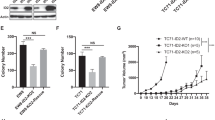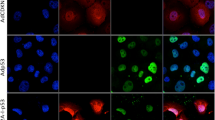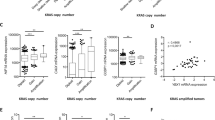Abstract
The human brain tumour cell line HBT20 is intrinsically resistant to etoposide and does not express mdr-1 mRNA. These studies were conducted to determine whether transfecting a Drosophila (D) topoisomerase II (topo II) gene into HBT20 cells could increase their sensitivity to etoposide. A D-topo II construct in a pMAMneo vector under the control of a mouse mammary tumour virus (MMTV) promoter was transfected into HBT20 cells. The gene is inducible by dexamethasone (Dex). The growth rate of the transfected cells and percentage of the cells in G1, S and G2M was no different than the parental cells. Survival after etoposide exposure (10 microM x 2 h) was measured by colony formation. Parental cells and cells transfected by pMAMneo vector alone showed no enhanced etoposide sensitivity after 24 h of Dex stimulation. By contrast, D-topo II transfected cells were sensitised 3-fold when etoposide treatment was preceded by 24 h Dex stimulation. Northern blotting and Western blotting confirmed that Dex had induced D-topo II expression in the sensitised cells. However, in D-topo II-transfected cells increasing the duration of Dex stimulation to 48 h eliminated the sensitisation to etoposide although increased MMTV promoter activity and expression of the D-topo II gene persisted. Measurement of endogenous human topo-II mRNA and protein revealed a decrease after Dex exposure of greater than 24 h. At these distal times, the total cellular topo II levels (endogenous + exogenous) may be decreased, which may explain why increased sensitivity to etoposide could no longer be demonstrated. This model suggests that D-topo II gene transfection can sensitise de novo resistant HBT20 cells to etoposide but that the time frame of that sensitisation is limited.
This is a preview of subscription content, access via your institution
Access options
Subscribe to this journal
Receive 24 print issues and online access
$259.00 per year
only $10.79 per issue
Buy this article
- Purchase on Springer Link
- Instant access to full article PDF
Prices may be subject to local taxes which are calculated during checkout
Similar content being viewed by others
Author information
Authors and Affiliations
Rights and permissions
About this article
Cite this article
Asano, T., Zwelling, L., An, T. et al. Effect of transfection of a Drosophila topoisomerase II gene into a human brain tumour cell line intrinsically resistant to etoposide. Br J Cancer 73, 1373–1380 (1996). https://doi.org/10.1038/bjc.1996.261
Issue Date:
DOI: https://doi.org/10.1038/bjc.1996.261
This article is cited by
-
Higher topoisomerase 2 alpha gene transcript levels predict better prognosis in GBM patients receiving temozolomide chemotherapy: identification of temozolomide as a TOP2A inhibitor
Journal of Neuro-Oncology (2012)
-
Altered expression of topoisomerase IIα contributes to cross-resistant to etoposide K562/MX2 cell line by aberrant methylation
British Journal of Cancer (2005)
-
Isolating the cDNA fragment inhibiting nontargeted mutagenesis in vero cell by antisense technology
Chinese Science Bulletin (1999)



